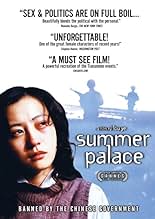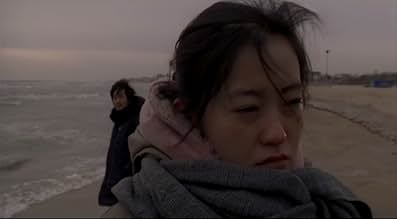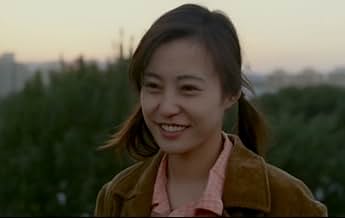IMDb RATING
7.2/10
4.5K
YOUR RATING
Yu Hong leaves her home village and starts university in Beijing, where she develops a consuming and compulsive relationship with another student. The student riots from 1989 then ensue and ... Read allYu Hong leaves her home village and starts university in Beijing, where she develops a consuming and compulsive relationship with another student. The student riots from 1989 then ensue and take a toll on their lives.Yu Hong leaves her home village and starts university in Beijing, where she develops a consuming and compulsive relationship with another student. The student riots from 1989 then ensue and take a toll on their lives.
- Awards
- 1 nomination
- Director
- Writers
- All cast & crew
- Production, box office & more at IMDbPro
Storyline
Did you know
- TriviaIn September of 2006, director Lou Ye was barred from making movies for five years because the film incorporated footage of the Tiananmen Square demonstrations and wasn't screened for Chinese officials. The Chinese government also demanded that all copies of the film be confiscated.
- GoofsThere were no nightclubs or bars in 1980's Beijing such as the ones portrayed in Summer Palace. Despite the presence of a few underground bars in Beijing at that time, it is highly improbably that any university students would patron such establishments. Moreover, those bars did not play American pop music, did not allow dancing, did not stock western liquor, and certainly did not admit foreigners. Any clubs or bars like the ones shown in Summer Palace did not begin appearing in Beijing until the late 1990s and did not gain popularity amongst middle-class college students until after the new millennium.
- ConnectionsFeatures The 400 Blows (1959)
- SoundtracksIn Yeon
Performed by Ha Dong-jin
Featured review
This Cannes Festival 2006 entry by the director of Suzhou River and Purple Butterfly (enjoyng very limited US theatrical release in early 2008) is more unwieldy but also bolder and more authentic than its predecessors, while still as moony and emotional and indebted to Wong Kar-wai and the French New Wave. You could compare this to Dr. Zhivago or Splendor in the Grass but despite its intense period flavor at times--the cluttered dorm rooms stay with you as do the rushing demonstrators, and the progression from bikes to nice cars and email is subtle but unmistakable--it hasn't got the structure or plot of the usual generation-spanning films; it's a hymn to love-longing posing as a contemporary historical epic. As such, it's poised for failure and doomed to be dismissed by many. But it's really great fun, a fluent, flowing, committed film with more to think about and respond to than much better-made and more tightly-edited work. And after it was shown at Cannes without official permission from home, it got Lou banned from film-making in China for five years.
Full of intense realistic sex and frontal nudity that would be daring anywhere not to mention China , Summer Palace focuses on a passionate young woman who comes from the country to study at Beijing University just before the Tiananmen Square demonstrations and massacre of 1988, and though it brilliantly evokes the excitement, freedom, and experimentation of that period for what is essentially the director's own generation (Purple Butterfly dealt with the 1930's), and it gives a sense of the chaos and horror that follows--this extended, breathtaking Tiananmen-period sequence is a tour de force--the politics are peripheral to protagonist Yu Hong (Hao Lei) and the intense love addiction she shares with Zhu Wei (Guo Xiaodong). But when the repression comes, Xiao Jun (Cui Lin), Yu Hong's high school boyfriend, with whom she had intense sex at the film's outset, comes to rescue her and take her back to Tumen, in the country. The turbulent give and take of man-woman relationships is as intense at times as anything in D.H. Lawrence, but with a sexual explicitness Lawrence achieved only in Lady Chatterley.
As played by the striking and talented Hao Lei, Yu Hong is a hell of a young woman, beautiful, alive, articulate, philosophical--her diary provides voice-over for many of the film's scenes--willful, and never satisfied with Zhou Wei, but never able till the end (fourteen years later) to let him go either. She doesn't want him, she says, but when she is with him she is happy. Any critique of the movie has to recognize that this is what it's about.
It's quite true that (once again) rain is used excessively, but like many a filmmaker before him Lou Ye recognizes that rain, cigarettes, alcohol and intense sex by good looking people are enough to make a movie atmospheric and sexy and compulsively watchable. Jaunty Chinese pop songs and bursts of passionate classical strings are used with a broad hand, but they always work in context.
Summer Palace is too long, and its wild abandon catches up with it in the diffuse, occasionally irrelevant sequences of the second half. When the political repression comes and Wei goes to Berlin along with Hong's best girlfriend Li Ti (Hu Lingling) and her boyfriend Ryi Gu (Zhang Ziannin), and there are details of the fall of the Berlin Wall and Perestroika that have far less urgency, the whole mood dissipates and the focus meanders. Hong, who's already caught Li Ti with the love of her life Zhou Wei, drifts or rather plunges greedily from one man to another. There's an abortion, a bike accident, adultery, a suicide, and other events, including a bittersweet reunion, but these are just blips in the long meditation on love-longing and life.
Shown at Cinema Village in New York City January-February 2008.
Full of intense realistic sex and frontal nudity that would be daring anywhere not to mention China , Summer Palace focuses on a passionate young woman who comes from the country to study at Beijing University just before the Tiananmen Square demonstrations and massacre of 1988, and though it brilliantly evokes the excitement, freedom, and experimentation of that period for what is essentially the director's own generation (Purple Butterfly dealt with the 1930's), and it gives a sense of the chaos and horror that follows--this extended, breathtaking Tiananmen-period sequence is a tour de force--the politics are peripheral to protagonist Yu Hong (Hao Lei) and the intense love addiction she shares with Zhu Wei (Guo Xiaodong). But when the repression comes, Xiao Jun (Cui Lin), Yu Hong's high school boyfriend, with whom she had intense sex at the film's outset, comes to rescue her and take her back to Tumen, in the country. The turbulent give and take of man-woman relationships is as intense at times as anything in D.H. Lawrence, but with a sexual explicitness Lawrence achieved only in Lady Chatterley.
As played by the striking and talented Hao Lei, Yu Hong is a hell of a young woman, beautiful, alive, articulate, philosophical--her diary provides voice-over for many of the film's scenes--willful, and never satisfied with Zhou Wei, but never able till the end (fourteen years later) to let him go either. She doesn't want him, she says, but when she is with him she is happy. Any critique of the movie has to recognize that this is what it's about.
It's quite true that (once again) rain is used excessively, but like many a filmmaker before him Lou Ye recognizes that rain, cigarettes, alcohol and intense sex by good looking people are enough to make a movie atmospheric and sexy and compulsively watchable. Jaunty Chinese pop songs and bursts of passionate classical strings are used with a broad hand, but they always work in context.
Summer Palace is too long, and its wild abandon catches up with it in the diffuse, occasionally irrelevant sequences of the second half. When the political repression comes and Wei goes to Berlin along with Hong's best girlfriend Li Ti (Hu Lingling) and her boyfriend Ryi Gu (Zhang Ziannin), and there are details of the fall of the Berlin Wall and Perestroika that have far less urgency, the whole mood dissipates and the focus meanders. Hong, who's already caught Li Ti with the love of her life Zhou Wei, drifts or rather plunges greedily from one man to another. There's an abortion, a bike accident, adultery, a suicide, and other events, including a bittersweet reunion, but these are just blips in the long meditation on love-longing and life.
Shown at Cinema Village in New York City January-February 2008.
- Chris Knipp
- Feb 17, 2008
- Permalink
- How long is Summer Palace?Powered by Alexa
Details
- Release date
- Countries of origin
- Official sites
- Languages
- Also known as
- 頤和園
- Filming locations
- Production companies
- See more company credits at IMDbPro
Box office
- Budget
- $2,500,000 (estimated)
- Gross US & Canada
- $63,045
- Opening weekend US & Canada
- $8,717
- Jan 20, 2008
- Gross worldwide
- $143,027
- Runtime2 hours 38 minutes
- Color
- Aspect ratio
- 1.85 : 1
Contribute to this page
Suggest an edit or add missing content



























